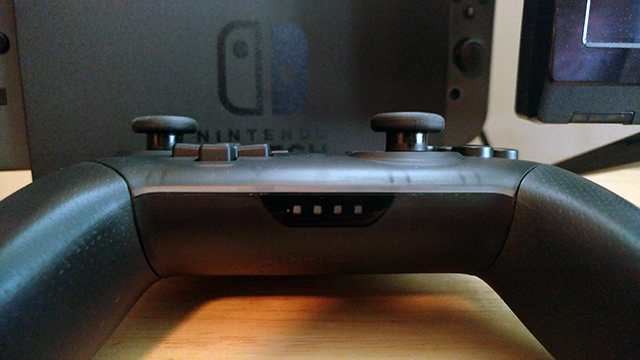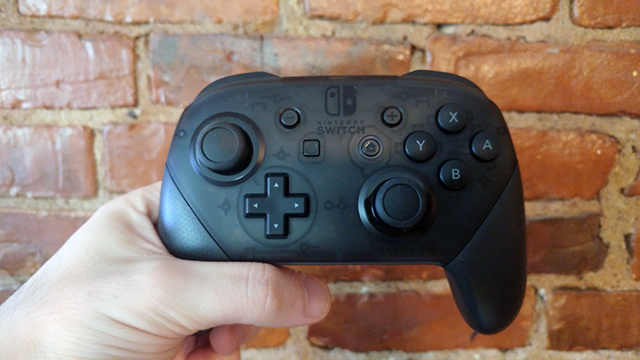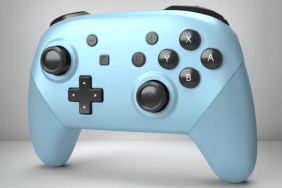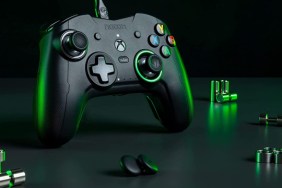Over the weekend I finally got my hands on a Nintendo Switch Pro Controller (they’d been backordered for quite a while), and my immediate take is that it’s truly a handsome device. The Pro pad is weighty and solidly built with robust analog sticks, buttons and triggers with just the right clickiness to squishiness ratio, and superb battery life (around 40 hours). It also sports HD rumble, as well as internal gyroscopes for things like motion steering in Mario Kart 8 or motion aiming in Zelda. Despite this buffet of core gamer goodness, there’s one issue I have with the Pro that may be difficult to overcome. It’s drastically, noticeably different from the Joy-Cons.
This may seem like exactly what you’d want, but I’m not talking about enhanced comfort or full-pad luxury, both of which are good things. I’m talking, in particular, about analog stick height, and thus analog stick distance.

You may have read or noticed that the Joy-Cons feature fully functional, but rather shrimpy analog sticks. They’re superior to the 3DS circle pad, and I’d say even superior to the Vita’s mini-sticks (though they also feel slightly more cheap). It’s true they’re short, and the distance from one fully-rolled direction to its opposite is thus rather quick. I noticed this when I bought Switch, and analog stick motion feels very different from, say, Sony’s DualShock 4. Given that they are entirely different consoles, and their respective games will likely only ever be played with one or the other, I accepted the situation as no big deal. My brain began laying down muscle memory in association with stumpy Joy-Con analog sticks, and no harm was done.
That’s where the Pro Controller comes in. For as much as the Pro is an enveloping armchair to the Joy-Cons’ wooden stool, it doesn’t change the fact that their analog sticks feel worlds apart from one another. My first three, five, and then ten Mario Kart 8 Deluxe races were negatively impacted using the Pro, as I skidded into walls and clunked around curves I’d normally cut with perfect precision. I eventually began to get the hang of the new situation, but it was getting late and I decided to switch (as is so often advertised by Nintendo) to handheld mode. Since my plan was to play in bed, I didn’t prop up the Switch and keep on with the Pro Controller, but instead attached the Joy-Cons for portable play.
The result? I was now useless in Mario Kart with the Joy-Cons as well. My brain, halfway calibrated between extravagant full-size analog sticks and the Joy-Cons’ functional but vertically challenged versions, had rendered me totally uncompetitive. This of course presents a dilemma. The whole reason I bought the Pro Controller was to avoid Joy-Con signal and reception issues in TV mode for a precision title like Mario Kart 8 Deluxe (it solves them handily). But if the tradeoff is constant swapping between short and long analog stick distance, I’m not sure if it's worth it. I could avoid either handheld or TV mode altogether for Mario Kart, but that defeats the purpose of Nintendo Switch. Yet if I return to Joy-Cons only, I’m back to making sure they're perfectly positioned and aimed directly at the Switch at all times, for fear of losing signal for a split moment and meeting my demise.

The whole thing has me rather exasperated and wanting to send my Pro Controller back to Amazon, despite the fact that it’s a superb, high-quality gaming pad on its own. It truly does feel nice – exceedingly plush, responsive, and comfortable. It’s possible my analog dilemma will become a non-issue for most games, but with Switch’s limited library and Mario Kart 8 and Fast RMX as two of its main time-sinks, it’s not hard to understand why this is annoying. There will likely be other precision genres on Switch where it's not ideal either.
I compared the sticks on the Switch Pro Controller to that of the Wii U Pro Controller, and the former felt taller with longer distance, albeit a less obvious gap than between it and Joy-Cons. I then compared with the DualShock 4, and the difference was even more subtle; they felt almost identical outside of differing rubber grip patterns. Still, the Switch Pro Controller’s analog sticks felt, even then, the slightest bit taller. In the case of the DualShock 4 it’s difficult to conclude, but the point is, frame of reference confirms this isn’t some mind game I’ve managed to play on myself.
There’s not much to be done about such a thing (unless a future Switch revision tailors its Joy-Con sticks to match the Pro), but I feel it’s worth mentioning for players considering the $70 device, unsure of whether or not it's worth it. My conclusion is that the Pro Controller in a vacuum is a full-featured, comfortable, and luxurious gaming input. But if you plan to swap between handheld and TV mode often, and tend to favor precise, competitive 3D games over Zelda adventures or Mario platforming, then you may want to consider saving your 70 bucks for something else.











